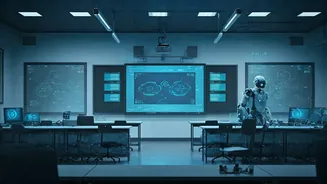Education's Foundation: Evolving
Education, at its core, is a dynamic process, never remaining stagnant. The methods of teaching and learning are continually adapting to stay aligned with
the progress of society. Historically, the purpose of education has always been to equip individuals with the knowledge and skills necessary to navigate the world. However, the nature of this 'world' is changing. The rise of new technologies, globalization, and shifting social paradigms have collectively redefined what constitutes a good education. Consequently, traditional approaches are increasingly being re-evaluated, and innovative methods are gaining prominence. Digital learning platforms, personalized learning pathways, and emphasis on critical thinking skills are emerging as pivotal elements. The ability to adapt and acquire new knowledge is becoming as essential as the subject matter itself.
Technology's Transforming Role
Technology is revolutionizing education, acting as a catalyst for significant advancements. Digital tools are offering unique opportunities for personalized learning. For instance, online learning platforms provide custom learning paths tailored to individual student needs and learning styles. The accessibility of educational resources is another major advantage of technology. Students can now access a vast array of information, from digital libraries to interactive simulations, all at their fingertips. Furthermore, technology facilitates global collaboration. Students can participate in virtual classrooms, collaborate on projects with peers worldwide, and gain broader perspectives on various subjects. However, the integration of technology isn't without its challenges. Issues like digital divide, the need for effective teacher training, and the responsible use of digital tools are matters of concern that require careful management to ensure the beneficial transformation of education.
Challenges Within Indian Context
The Indian education system is grappling with several significant challenges. One of the primary issues is the disparity in access to quality education. Many regions still lack adequate infrastructure, qualified teachers, and essential learning materials, causing inequalities. Curriculum reform is another area of focus. While there is a need to make curricula more relevant to the demands of the 21st-century, the process of implementation faces obstacles. The shortage of teachers, inadequate funding, and the digital divide are only a few of these. Furthermore, ensuring that students develop skills in critical thinking, problem-solving, and creativity is critical, and this is an area where improvement is needed. The government and educational institutions are working toward resolving these challenges. Strategies include investing in infrastructure, teacher training, and curriculum upgrades. Addressing the digital divide through initiatives that expand digital literacy and access to technology is crucial to ensure equitable education for all.
Future of Learning Trends
Several emerging trends are set to reshape the future of education. Personalized learning, where education adapts to meet the individual needs and pace of each student, is gaining traction. The use of artificial intelligence (AI) in education, for example, is becoming more prevalent, assisting in the assessment of student progress and tailoring learning content. There's also an increasing emphasis on experiential learning—learning by doing—including hands-on projects, internships, and real-world applications of knowledge. The rise of hybrid learning models, which blend online and offline elements, offers greater flexibility and adaptability. In India, there's growing interest in integrating vocational training and skill development into mainstream education, which will prepare students for jobs and entrepreneurship. Furthermore, educational institutions and policymakers will need to adapt to these trends, investing in infrastructure, and training teachers to effectively implement these approaches.












